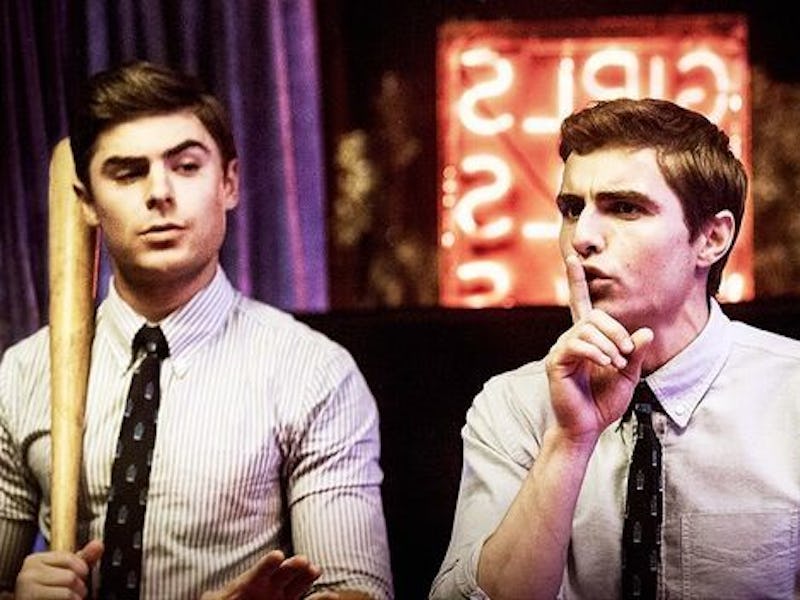Male camaraderie has always been a sacred thing. The Rat Pack embodied it, the League of Extraordinary Gentlemen celebrated it, and, more recently, Zac Efron and Dave Franco renewed their vows to it in a famous scene in 2014’s Neighbors. “Bros before hoes,” Efron jeers, kicking off a volley of loosely related metaphors that ends with “John Madden — before Jasmine from Aladdin!” The scene, hilarious in its cultural accuracy, parodies a serious issue that Harvard researchers recently warned against in a new report on hookup culture: Bro mentality is fine until it becomes a force against women.
Unfortunately, as the scientists from Harvard’s Graduate School of Education found while studying why people aged 18 to 25 have such bad experiences of romantic relationships, it’s almost exclusively celebrated that way among young men. “A ‘bro’s over ho’s’ culture exists among many men on myriad college campuses across the country and misogyny is often brazen, if not celebrated,” the researchers wrote in their study on hookup culture, which was released on May 17 and encompassed data on 3,000 high school students and young adults across the United States. (The issue is inherent in the culture’s name, which uses a slang term for prostitutes as a synonym for women.)
Their study, part of a project called Making Caring Common, was meant to pinpoint ways that adults can help the youth have better experiences of romance and love. In addition to being ill-prepared for romantic relationships, young adults were found to have a concerning amount of experience with sexual harassment and misogyny. Young women, obviously, were the primary victims, and the researchers trace the roots of these concerning phenomena back to the pervasiveness and wide acceptance of misogynist bro culture, which maintains that male relationships and male needs trump those of women by default.
Ultimately, the researchers are forced to ask: Why haven’t the boundaries of this dangerous mentality been kept in check? They place the burden of blame on adults, who are scolded for not being as responsible as they should be; most adults, they write, “appear to be doing shockingly little to prevent or effectively address pervasive misogyny and sexual harassment among teens and young adults—problems that can infect both romantic relationships and many other areas of young people’s lives.”
In particular, they call out adults’ ambivalence toward events like frat parties with themes like “CEOs and Secretary Ho’s” or “Ninja Bros and Geisha Ho’s” and their acceptance of misogynistic language (“pop that pussy”) in music, which perpetuates unrealistic ideas of what sex should be like. Porn and lifestyle magazines, they note, do the same.
The problem is, of course, that the negative effects of bro culture aren’t just felt by teens but apply to adults too. President Donald Trump’s extremely white and male cabinet is very much the adult embodiment of bro dominance over women. Even adult attempts to address misogyny in film tend to fall flat, as the revenge porn plot in the new Power Rangers film illustrated. How are we supposed to help teens if we can’t help ourselves?
Acknowledging the existence of issues in conversations with teens — even if we don’t know how to solve them — is the first step, the researchers suggest, encouraging adults to have “The Talk” with young adults. Doing so might not be as hard or awkward as it may seem: In their survey of 18 to 25-year-olds, the researchers found that 65 percent of young people actually want guidance on how to conduct themselves romantically and sexually. In a previous interview on adolescent sexuality with Inverse, psychotherapist Dr. Andrew Smiler, who specializes in treating young men and teenage boys, reported a similar pattern, noting that this demographic is often confused by the aggressive male sexuality and promiscuity presented to them by the media.
In 2016, Efron returned to the big screen in Neighbors 2, which flipped the original film’s gender roles by casting members of a rowdy sorority as the titular antagonists. The film, which suggested that “chicks over dicks” culture could be just as crass, fun, and destructive as the “bros over hoes” mindset, was lauded for its progressiveness, but celebrations were a bit premature. While the film gave audiences a glimpse of what equality could look like among millennials, the data, unfortunately, suggest we’ve got a long away to go.
